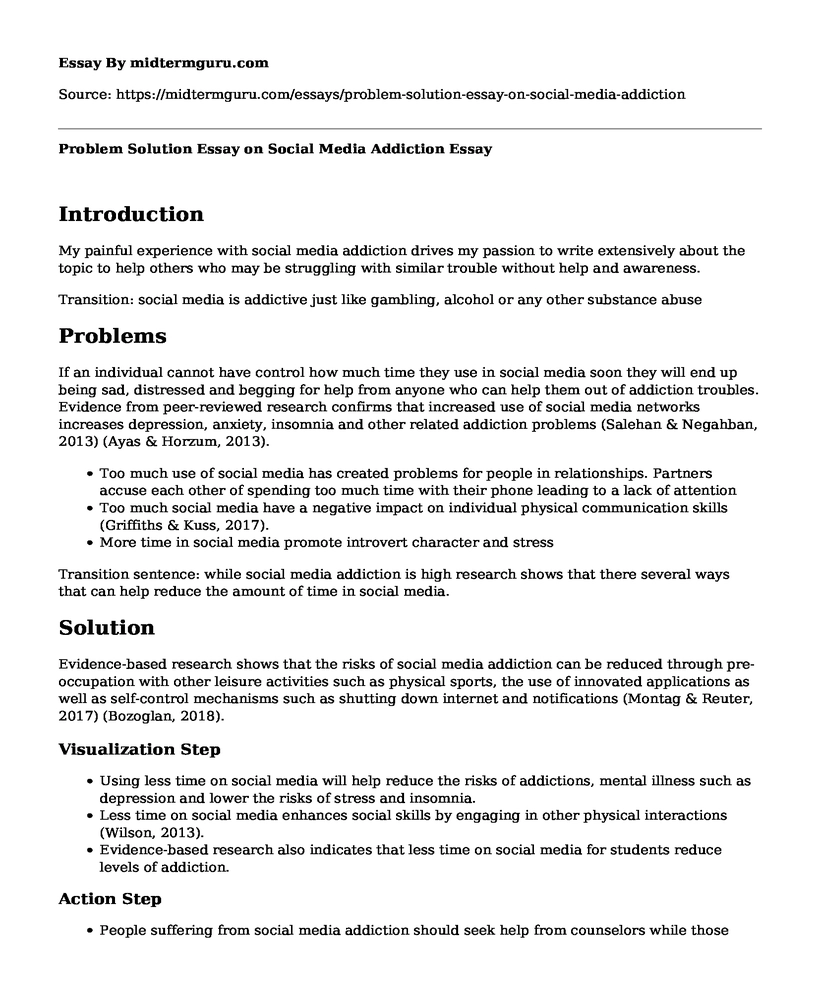Introduction
My painful experience with social media addiction drives my passion to write extensively about the topic to help others who may be struggling with similar trouble without help and awareness.
Transition: social media is addictive just like gambling, alcohol or any other substance abuse
Problems
If an individual cannot have control how much time they use in social media soon they will end up being sad, distressed and begging for help from anyone who can help them out of addiction troubles. Evidence from peer-reviewed research confirms that increased use of social media networks increases depression, anxiety, insomnia and other related addiction problems (Salehan & Negahban, 2013) (Ayas & Horzum, 2013).
- Too much use of social media has created problems for people in relationships. Partners accuse each other of spending too much time with their phone leading to a lack of attention
- Too much social media have a negative impact on individual physical communication skills (Griffiths & Kuss, 2017).
- More time in social media promote introvert character and stress
Transition sentence: while social media addiction is high research shows that there several ways that can help reduce the amount of time in social media.
Solution
Evidence-based research shows that the risks of social media addiction can be reduced through pre-occupation with other leisure activities such as physical sports, the use of innovated applications as well as self-control mechanisms such as shutting down internet and notifications (Montag & Reuter, 2017) (Bozoglan, 2018).
Visualization Step
- Using less time on social media will help reduce the risks of addictions, mental illness such as depression and lower the risks of stress and insomnia.
- Less time on social media enhances social skills by engaging in other physical interactions (Wilson, 2013).
- Evidence-based research also indicates that less time on social media for students reduce levels of addiction.
Action Step
- People suffering from social media addiction should seek help from counselors while those with high-risk behaviors need to work on discussed tips to help avert the problem.
References
Ayas, T., & Horzum, M. B. (2013). Relation between Depression, Loneliness, Self-Esteem and Internet Addiction. Education, 133(3), 283-290
Bozoglan, B. (2018). Psychological, social, and cultural aspects of Internet addiction. Hershey, PA : Information Science Reference
Griffiths, M. D., & Kuss, D. J. (2017). Adolescent social media addiction (revisited). Education & Health, 35(3), 3-6.
Montag, C., & In Reuter, M. (2017). Internet addiction: Neuroscientific approaches and therapeutical implications including smartphone addiction
Salehan, M., & Negahban, A. (2013). Social networking on smartphones: When mobile phones become addictive. Computers in Human Behavior, 29(6), 2632-2639.
Wilson, C. (2013). Under the Social Influence : Going From Reckless to Responsible in Today's Socially Distracted Society. New York: Morgan James Publishing.
Cite this page
Problem Solution Essay on Social Media Addiction. (2022, Sep 28). Retrieved from https://midtermguru.com/essays/problem-solution-essay-on-social-media-addiction
If you are the original author of this essay and no longer wish to have it published on the midtermguru.com website, please click below to request its removal:
- Essay About Lincoln Steffens
- Example of Debates About the World Oldest Man - Paper Example
- Problem Solution Essay on Social Media Addiction
- Paper Example: What Is Theatre Review?
- Compare and Contrast Essay on 'The Notebook' Film and Novel
- Essay Sample on Sexism in Advertising Industry
- Movie Analysis Essay on the Lego Movie 2: Building a World







